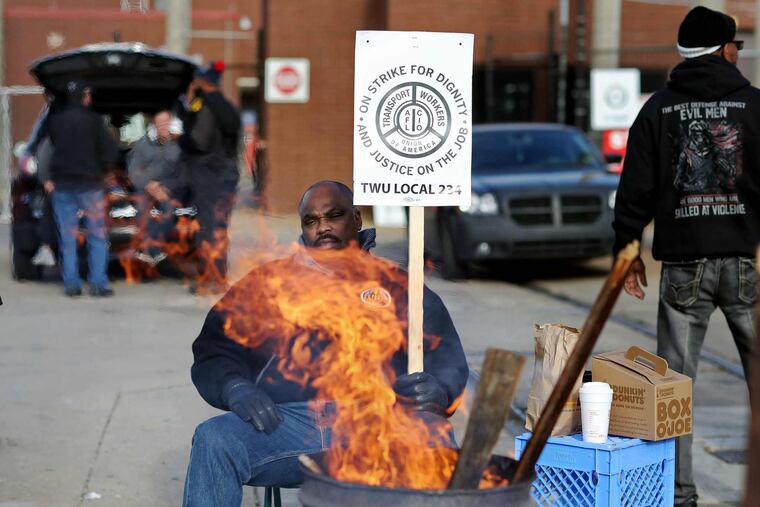SEPTA transit union tells members to be ready for a strike vote
A union demand for paid parental leave has emerged as a sticking point in negotiations.

Transport Workers Union leader Willie Brown warned local members to stand by for a strike authorization vote Sunday in a videotaped update of contract negotiations with SEPTA as talks enter the final stretch.
» UPDATE: SEPTA, union avoid strike by agreeing to new contract
Management’s wage proposals mean TWU members’ wages would not keep pace with increases recently given to other public unions in the region, he says.
“We’re not going to accept lower wages,” said Brown, longtime president of TWU Local 234, which represents about 5,000 vehicle operators, mechanics, and maintenance workers. “You deserve better. Your families deserve better.”
The current contract expires Oct. 31, and the two sides began a series of intense talks this week, often sequestering at the Wyndham Philadelphia Historic District hotel.
Union leaders later in the day scheduled an 11 a.m. membership meeting Sunday at the Sheet Metal Workers Local 19 union hall on Columbus Boulevard.
A strike authorization, if approved, does not mean the workers would hit the bricks right away, or at all. It is a necessary first step that can give union negotiators leverage.
If the agency and the union are close to an agreement at the deadline, TWU Local 234 members could work under an extension or without a new contract to allow further negotiations, sources familiar with the talks said.
SEPTA transit workers have walked out at least a dozen times over the last several decades, most recently in 2016. In a Tuesday email to thousands of employees and families, Philadelphia School District Superintendent William R. Hite Jr. said city schools are making plans to cope with a possible strike, which could require some or all schools to shift to 100% virtual instruction.
About 60,000 students rely on SEPTA to get to their schools; many of the district’s 20,000 workers also use transit.
At the core of the conflict: $1.5 billion SEPTA has received in federal pandemic relief.
SEPTA says it’s ailing because of decimated ridership and has to make the federal money last until it bounces back. Union members call the aid a windfall and say authority officials can afford to reward the frontline workers who have kept the trains, trolleys, and buses running during the pandemic.
One of the biggest sticking points is paid parental leave, Brown said, adding that SEPTA has resisted that demand.
» READ MORE: Transport workers union warns members to prepare for tough contract talks with SEPTA
“The two most powerful people in SEPTA are women — if we can’t get them to understand, how can we get anyone to understand?” Brown said, referring to system general manager/CEO Leslie S. Richards and Stephanie Deiger, the agency’s chief of staff.
He said that “if one of our union sisters is pregnant,” they must use up all their sick time before being granted any kind of leave. “We’re demanding they treat our sisters like human beings.”
When parents return to work, they have to work for a year to earn more sick time, Brown said.
SEPTA is offering a choice between a short-term contract of two years, with a small wage increase and a pandemic payment for union members, and a longer-term contract that does not guarantee wage increases but makes them contingent on how well the transit system recovers.
“Because we don’t know when ridership is going to come back, it’s hard to make projections for the longer term,” SEPTA spokesperson Andrew Busch said. The system is carrying about 47% of the number of passengers it did in 2019.
“We have to find a way to provide fair wages and benefits to employees while also facing the challenges ahead,” he said.
» READ MORE: SEPTA intends to spend $40M in federal COVID-19 relief on proposed King of Prussia line
A four-year contract offer with no guaranteed raises is an “insult to our intelligence,” union officials said in the most recent TWU Local 234 newsletter. They cite what they see as improvident spending, such as $7 million for management consultants McKinsey & Co. and millions earlier this year to advance the proposed King of Prussia rail extension.
“SEPTA put $40 million aside for a King of Prussia line that may or may not happen in our lifetime, in the middle of a pandemic,” Brown said.
Other contentious issues: Union leaders said in a newsletter last week that SEPTA would like to eliminate a no-layoff contract clause and have the right “to use new technology, including autonomous vehicles.” SEPTA also wants to stop a scheduling practice that allows operators with the most seniority to choose longer runs with guaranteed overtime.
In addition, Brown said, the authority needs a bigger police presence on the system amid a rising number of assaults and verbal abuse of TWU members.
“No matter how much PR SEPTA uses … if you don’t create a safe work environment, you don’t have a safe riding environment and the riders are not going to come back,” he said in the video.